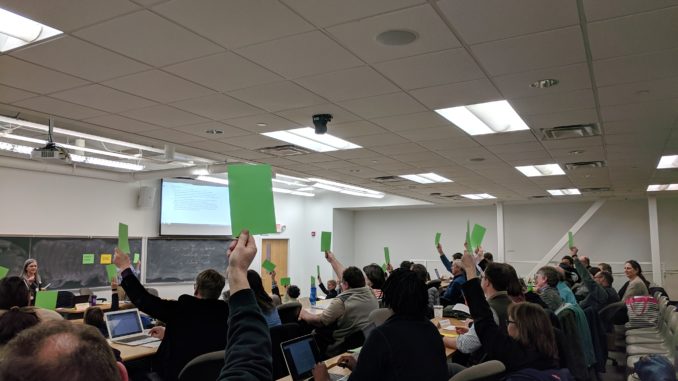
The Dialogues will be phased into implementation after a vote by Truman State University’s Faculty Senate and Undergraduate Council.
For the 2019-20 school year, the existing Liberal Studies Program will remain in effect while the Self & Society Seminar is implemented as a graduation requirement and the one-credit Truman Days is removed. Truman will still conduct Truman Days, but it no longer has the four-hour component it previously had. The Personal Well-Being Essential Skill will also be replaced by a campus-wide wellness initiative.
The bill states The Dialogues will be in full swing for the 2020-21 school year.
Faculty Senate President Scott Alberts said after meeting with University administration, listening to Student Government’s concerns and considering the falling enrollment, he thought it would be best to implement only the completed portions of the new curriculum. This leaves the Disciplinary and Interconnecting Perspectives and Truman Symposium among the changes that will be put into place later.
Truman opted to change its curriculum with a faculty vote last spring. The Dialogues, the new curriculum, is supposed to allow more freedom in choosing courses while also aligning with the state’s CORE 42 requirement.
Faculty Senate and UGC have been working to develop the different Perspectives and demands of The Dialogues since last year.
Alberts said he called the joint session with UGC because both groups had been having discussions about postponing or phasing in the new curriculum, so it made more sense to have this discussion together. This also sped up the process of passing initiatives through both assemblies.
There was also a deadline, Alberts said, because the registrar would need time to finalize the official catalog, no matter what faculty governance decided. The course catalog deadline, by which available courses and requirements have to be established, is late March.
“I think it really was just crunch time,” Alberts said. “We needed to decide we were either going to phase in some of this or we’re going to have to really kind of reallocate resources to make sure we get the stuff done on time.”
Alberts said this optimism allowed Faculty Senate and UGC to accomplish more than they might have without the one-year deadline. For example, the Truman Symposium Committee might decide to run another pilot test based on what they learned from the one conducted last fall.
Reworking the curriculum also allowed Truman to adapt to the CORE 42 recommendation sooner than anticipated, he said.
“Even, I think, the initial idea that we could do it this fast was maybe just a little optimistic for us,” Alberts said.
UGC chair Justin Jarvis brought a motion to UGC in its Nov. 8 meeting to delay the implementation of The Dialogues entirely by one year, but the group strongly opposed it.
“It’s good to have optimism, and I didn’t want to stand in the way of it at UGC either,” Jarvis said. “I’m like, ‘Jeez, if everyone is that excited about this, well, like, let’s do it.’ That gave us the motivation to go to two-a-month meetings.”
This decision to phase implementation of The Dialogues creates three different catalogs students might be under, depending on when they are admitted to Truman. There will be the current LSP catalog, the transitional one with parts of each curriculum and The Dialogues catalog. Students can choose to adopt a newer catalog, and Alberts said this will not put them behind because the classes should still fit graduation and major requirements.
Jarvis said faculty governance realized there was still a lot to do as it got further along in the process. Student Government also passed a resolution asking faculty governance to slow down by delaying the implementation, which Jarvis said many faculty members paid attention to.
Alberts said faculty heavily considered the student input because students are best fit to determine if something is working or not.
“I really switched just in the last few weeks,” Alberts said. “I was sort of — and again I was chair of the Symposium committee — and one of my motivations was that if it’s really true that the students didn’t have a great experience, if it’s really true that Student Government isn’t helping us … and I think that’s one of the things that really convinced me is that we really need everyone to be pulling for this.”
Alberts said he is not concerned about a continual postponing of The Dialogues because there is excitement for the new curriculum.
Jarvis also said he does not think the new curriculum will be in development past next year.
“I personally don’t see it getting pushed off again because it has gotten pushed off a couple of times, but it never really got started those other couple of times,” Jarvis said. “This is completely different. We are like three-fourths the way into it.”
Jarvis said he hopes the new deadline doesn’t slow progress and UGC will continue to meet twice every month to work on The Dialogues.
University President Sue Thomas said she thought the vote to phase in The Dialogues and the discussion leading up to it was a testament to the commitment faculty have for the new curriculum.
“I thought it was a very powerful, impressive discussion by the faculty,” Thomas said. “And thinking about where’s the best to land to do the very best job they could with the new curriculum. So, I thought it was wonderful.”
Thomas said she thinks a phased implementation makes the most sense given what faculty governance has accomplished and what still needs to be done.
She said this decision in no way diminishes the work they have done, but with more time, Faculty Senate and UGC can address every aspect as they wish to.
“We went into this process wanting to talk about how Truman can distinguish itself,” Thomas said. “How it can excite students about what goes on here at Truman. All of that contributes to enrollment.”
